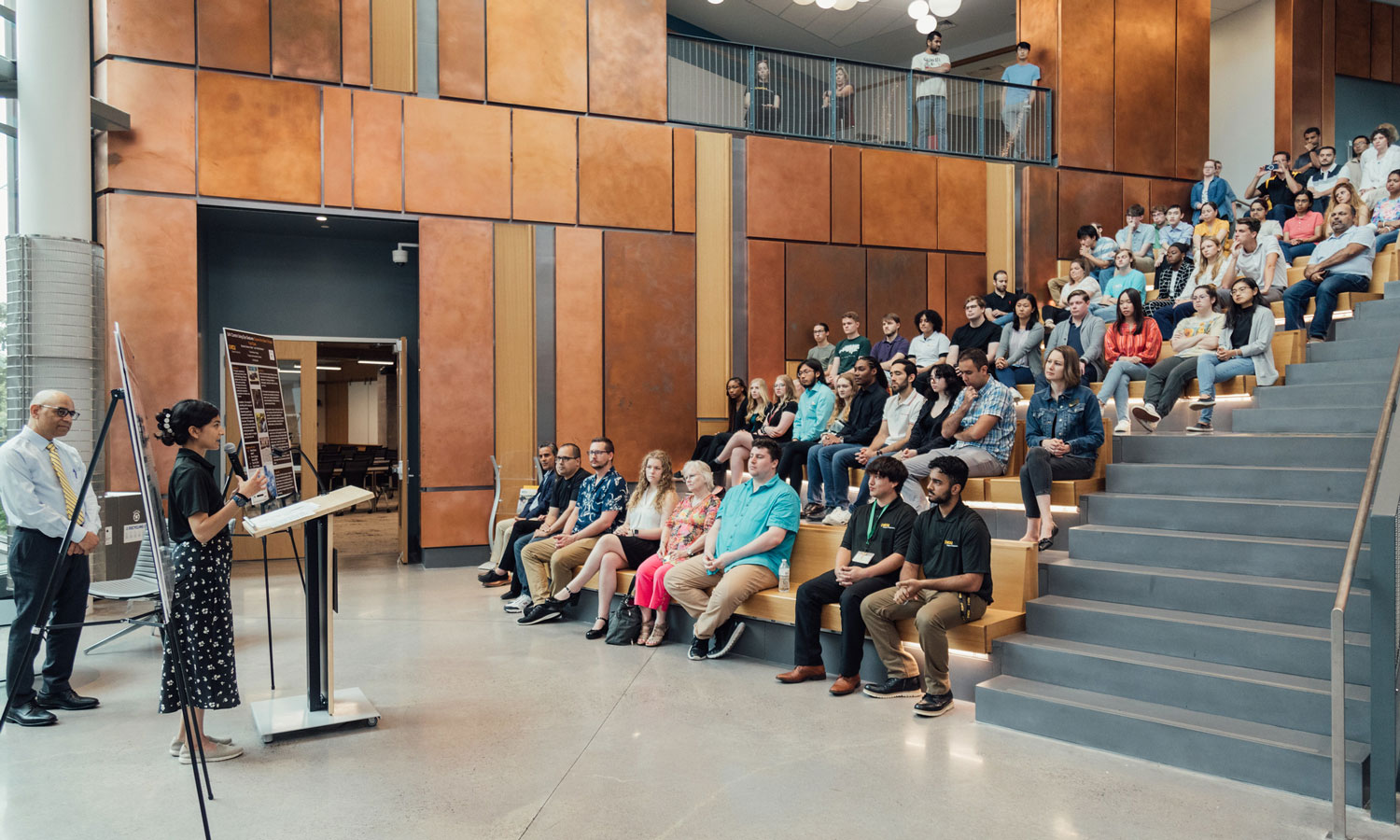Undergraduate students from universities across the country have come to VCU to participate in the Research Experience for Undergraduates (REU) hosted by the College of Engineering, ranging in topics from developing complex pharmaceutical products to natural language processing.
Students come from universities as close as North Carolina State University and Duke, and as far as Oregon State University.
Multiple departments are hosting students, from computer science to chemical and life sciences, and even a collaborative REU with the School of Pharmacy.
The program runs for approximately 10 weeks each summer, leading to a symposium in August where students present their research. This year’s symposium was held on Aug. 3 in the Engineering Research Building.
“Research experience is the major takeaway for the students, especially for students who have never gotten to participate in research before. Some come from non-research oriented colleges to have that experience at VCU, some come from bigger colleges where they haven’t been able to break into the research experiences.,” said Kostadin Damevski, Ph.D., associate professor of computer science at VCU.
Damevski is one of three faculty members leading the REU titled, “End User Programming for Cyber-Physical Systems,” alongside Eyuphan Bulut, Ph.D., and Bridget McInnes, Ph.D. There are two teams of students researching under Damevski, one focusing on detecting toxic content in programmer communications, the other using Chat GPT to understand security vulnerabilities better.
“The REU program reflects our belief in computer science and the transformative power of research experiences,” said McInnes. “These experiences go beyond traditional classroom learning. They offer students hands-on involvement in real-world research, where they can explore their interests, develop critical thinking skills, and contribute meaningfully to scientific advancement.”
Depending on the REU, some students work in teams while others do individual research. No matter the structure of the research project, they all work in collaborative spaces with support from faculty, graduate students and each other.
“They get to know students from other universities and spend 10 weeks living here in the dorms,” said Damevski. “With them working side-by-side, it builds connections between the students and even professors. I have some REU students who still keep in touch from time-to-time, which I think is a very nice perk of the program.”
Grace Guimond, a rising junior and chemistry major at VCU, is researching under Nastassja Lewinski, Ph.D., and Thomas Roper, Ph.D., with the Department of Chemical and Life Science Engineering.
Guimond’s REU is centered around optimizing the process of synthesizing Active Pharmaceutical Ingredients (API), which are any substance that forms a manufactured drug’s active ingredient. She is using a machine learning program to better understand the ways to synthesize and create the best possible product. Most of her time is spent in the lab, researching with the guidance of professors, Ph.D. and graduate students.
When she is not in the lab, Guimond works in a collaboration space with other students from the REU. Sometimes this work consists of reading and discussing articles, summarizing the work they did the previous week or, for Guimond, learning how to code.
“My biggest takeaway from this experience is just experience,” said Guimond. “This internship (REU) is a very good intermediate step in going out into the workforce, because it’s building on techniques I’ve already learned in the lab and giving them a professional spin.”
Understanding the breadth of research happening across the departments is integral to many students as they contemplate their educational future.
“Now I have a better idea of what I want to do and where I want to apply to graduate school, " said Guimond. “All of the graduates really like it here, so I think I really want to go to graduate school here. I also want to explore doing a Ph.D. program, which I hadn’t really considered before this experience. Seeing other students doing it made it very real to me.”
As the REUs come to a close for the summer, students are leaving having done prominent research with highly knowledgeable faculty mentors while forming connections with other students and graduates. For students like Guimond and many others, the REU program has been truly unforgettable.
Congratulations to the following students who presented at the REU symposium.
Alina Zaidi
Seeding and proliferation of smooth muscle cells on electrospun PCL scaffolds
Mentors: Joao Silva Soares, Ph.D.; Carlos Blank
Jack Farley
Imitation and reinforcement learning for collaboration of outage aware UAVs
Mentors: Eyuphan Bulut, Ph.D.; Amir Chapnevis
Brandon Vilela and Kshitij Kokkera
UAV control using eye gestures: explore the skies through your eyes
Mentor: Kosta Damevski, Ph.D.
Congratulations to all students who participated in this year’s summer REU program.
End-User Programming of Cyber-Physical Systems
Computer Science
Mentors: Eyuphan Bulut, Ph.D.; Kosta Damevski, Ph.D.; Bridget McInnes, Ph.D.
Students: Xander Cole, Thomas Moomaw, Brandon Vilela, Jack Farley, August Moses, Grant Webb, Byron Hedden, Allyson Smith, Bobby Zita, Adrian Lackey, Trisha Taparia
Pharmaceutical Engineering
Mentors: Thomas Roper, Ph.D.; Sandro da Rocha, Ph.D.
Students: Gabrielle Broussard, Kristal Hines-Pressley, Kevin Ruiz, Hannah Gedde, James Kurdi, Josie Walz, Alison Goehl, Emily Lane, Connor Hauff, Roger Matthew
Biomedical Engineering
Mentors: Rebecca Heise, Ph.D.; Hank Donahue, Ph.D.; Priscilla Hwang, Ph.D.; Jennifer Puetzer, Ph.D.
Students: Samantha Graham, Phoebe Senjaya, Reem Hammad, Anastasia Zola
Chemical and Life Science Engineering
Mentors: Frank Gupton, Ph.D.; Mo Jiang, Ph.D.; Natassja Lewinski, Ph.D.; Thomas Roper, Ph.D.; Leah Spangler, Ph.D.; Vamsi Yadavalli, Ph.D.
Students: Jillian Blount, Justin Lacy, Connor Richeson, Aubrey Carey, Barry Najarro-Blancas, Mateja Smith, Grace Guimond, Vivian Payne, Michael Vo, Simon Friedrich, Kelley Pryor
Computer Science
Mentor: Eyuphan Bulut, Ph.D.
Student: Kshitij Kokkera, Maya McDonough
Electrical and Computer Engineering
Mentor: Vitaliy Avrutin, Ph.D.
Student: Brian Janicki, Ziang Jiao
Mechanical and Nuclear Engineering
Mentor: Gennady Miloshevsky, Ph.D.; Karla Mossi, Ph.D.; Joao Silva Soares, Ph.D.; John Speich, Ph.D.
Students: Maximillian Bradley, Jacob Leonard, Alina Zaidi, Thane Gesite, Suttipat Muangna, Naoki Heginbotham, Isabelle Pummill
View all of the photos from the symposium.
